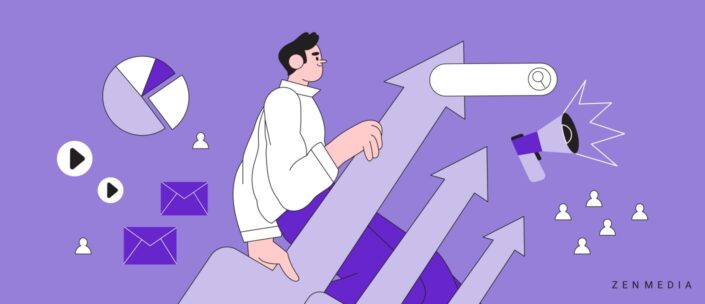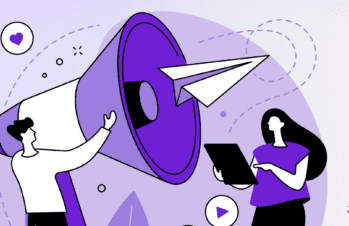We obviously love cookies—they’re tasty, bite-size snacks fit for any and every occasion! But when it comes to third-party cookies on the world wide web, many people feel like they can most certainly do without.
Most of us are familiar with third-party cookies: various small text file domains drop into browsers to store anonymous information about the user’s browsing history, which is then sent to the domain’s server. The cookies are used to create a unique behavior profile for each user, which brands use to display ads or other messaging based on the user’s online activity.
Remember that text box that pops up at the bottom of sites you visit, and you can choose to “Reject” or “Accept”? That’s third-party cookies!
Well now, third-party cookies are going away—they were first on their way out in 2017. The imminent death of third-party cookies poses significant challenges to B2B brands and marketers seeking effective targeting and personalized advertising solutions.
Google specifically is making the transition from third-party cookies to a more privacy-conscious approach, but there are still many concerns about the jump.
What’s Google Going to Do Without Cookies?
While Chrome isn’t the first browser to phase out third-party cookies, it is the biggest. Other browsers (like Safari and Firefox) have been blocking third-party cookies since 2013, and we’ve seen repeatedly that trackers simply resort to workarounds, other methods, and new technologies that make them able to track users just the same.
Google’s strategic journey to bring in the end of cookies has been years in the making, dating back to 2020. Now the plan for Google is to disable third-party cookies for a select 1% of Chrome users in Q1 2024 before completely deprecating third-party cookies by the second half of 2024. It’s already rolled out its Federated Credential Management API (FedCM) to help combat passively shared browser data.
The latest plan to phase out third-party cookies in Chrome is part of a larger strategy of creating a privacy sandbox with open standards for tracking users while protecting their privacy. Google’s commitment to user privacy and data protection aims to uphold consumer trust, including the potential impact of enhanced data privacy on customer relationships. Additionally, Google doesn’t plan on removing all tracking data from Chrome.
First-party cookies are directly linked to a brand’s own data about consumers—behaviors, preferences, pain points, etc. By using first-party data, marketers can gain valuable insights into a user’s activity on their website, including their frequency of visits and basic analytics. This information can aid in the development of an effective marketing strategy, targeting specific demographics to produce more relevant advertisements and other B2B content.
What Google’s Third-Party Cookie Deprecation Means For B2B Brands
Concerns over the Google cookie deprecation are centered around its effect on the digital economy, especially marketing. No third-party cookies could potentially mean less accuracy, personalization, and engagement when crafting digital campaigns.
Google Chrome’s privacy efforts could heavily impact some areas of the marketing and advertising space, while other tactics will still stay pretty much the same. Now, professionals in the marketing and advertising space must focus their attention on first-party cookies, which are more reliable and adhere to privacy standards.
Google’s delay is due to give marketers and advertisers enough time to tweak their strategies and not be blindsided when the transition occurs. As a result, this shift allows marketers to innovate alternative strategies to create similar—if not better—experiences for their audience and learn more about them without intruding.
How B2B Brands Should Market Themselves in Google’s Cookieless Future
The best thing to do as a marketer or advertiser is to stay up-to-date with news related to third-party cookies and other data privacy moves that could impact your business. It’s pretty easy to get lost in the transition to a cookieless future, but there are different ways to prepare.
Contrary to what many believe, third-party cookies aren’t necessities for online advertising. Leveraging first-party data can optimize and evolve B2B marketing strategies. This is possible by using the data with:
- Contextual Advertising: An old-school method where ads are placed in publications alongside related content to the advertised product or service, potentially opening consumers to new brands that will effectively capture their attention.
- Email Marketing: Making a strong comeback for personalized messages and converting consumers into customers.
- Improved ROI: With first-party data, marketing strategies can experience a boost in engagement and lead nurturing to ensure a successful execution regardless of whether consumers convert.
Website owners, marketers, and businesses could have a harder time with transitioning away from cookies. Digital marketing may experience the biggest impact—but it won’t be the end of the world. In fact, this new era without third-party cookies could be advantageous.
Even without third-party cookies, brands still get access to highly unique ad data—their consumers just don’t have to succumb to privacy invasion. If we marketers learn anything from this, it’s that consumers value nothing more than their privacy.
Moral of the story: Oreos are forever, but third-party cookies are being phased out. Don’t risk losing your customers’ interest by not preparing for what’s coming next. Need help getting started? Let’s chat.







